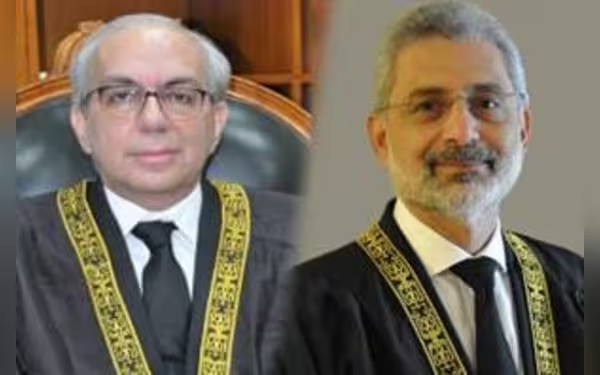Friday, October 4, 2024 08:31 AM
Supreme Court Dispute Over Article 63A Disqualification
- Supreme Court reviews Article 63A disqualification petitions.
- Justice Akhtar's absence raises concerns over bench composition.
- Hearing impacts governance and judicial integrity in Pakistan.
 Image Credits: nation_pk
Image Credits: nation_pkThe Supreme Court of Pakistan addresses Article 63A disqualification petitions amid tensions over bench composition and judicial integrity.
The Supreme Court of Pakistan is currently embroiled in a significant legal dispute regarding Article 63A of the Constitution, which pertains to the disqualification of lawmakers. This issue has gained attention due to the absence of Justice Munib Akhtar, who was recently removed from the bench formation committee by Chief Justice Qazi Faez Isa. The absence of Justice Akhtar has led to the deferral of the hearing of review petitions against the apex court's ruling on this crucial constitutional matter.
On Monday, a five-judge bench, led by Chief Justice Isa, convened to address the review petitions. At the beginning of the session, Chief Justice Isa expressed his surprise at Justice Akhtar's absence, especially since former Chief Justice Umar Ata Bandial has retired and Justice Ijaz ul Ahsan has resigned. This situation necessitated the inclusion of Justice Amin-ud-Din Khan in the bench. Chief Justice Isa emphasized the importance of transparency, stating that judges who initially heard the petition should also be present for the review hearings.
Justice Akhtar had previously communicated his inability to participate in the bench through a letter, which he insisted should not be interpreted as a recusal. He requested that his note be included in the case file, but Chief Justice Isa declined this request, reiterating that judges should express their concerns during court proceedings. The Chief Justice also highlighted the urgency of the review petition, which has been pending for over two years, asserting that it significantly impacts good governance.
During the proceedings, Additional Attorney General Aamir Rehman supported the Chief Justice's position, urging Justice Akhtar to join the bench. Meanwhile, Barrister Ali Zafar raised concerns about the composition of the committee responsible for forming benches, arguing that decisions should not be made by just two members. Chief Justice Isa responded firmly, stating that the court would not be hindered by the absence of any single judge.
As the hearing progressed, Justice Jamal Khan Mandokhel questioned the authority of the president to issue ordinances, particularly regarding the suspension of the SC (Practice & Procedure) Act 2023. This inquiry reflects the ongoing complexities surrounding the legal framework within which the Supreme Court operates.
In a notable moment, Barrister Zafar, representing former Pakistan Tehreek-e-Insaf (PTI) Chairman Imran Khan, faced challenges in obtaining a Power of Attorney due to restrictions from jail authorities. Despite these hurdles, the bench accepted his application, allowing the proceedings to continue.
The Supreme Court is set to reconvene on Tuesday at 11:30 AM, with Chief Justice Isa indicating that if Justice Akhtar remains unwilling to participate, another judge will be appointed to the bench. This situation underscores the ongoing tensions within the judiciary and the critical nature of the issues at hand.
As the legal community and the public await further developments, it is essential to recognize the implications of this case on Pakistan's political landscape. The outcome of the review petitions could set significant precedents regarding the powers of lawmakers and the judiciary's role in upholding constitutional integrity. The unfolding events serve as a reminder of the delicate balance between judicial independence and accountability in a democratic society.













